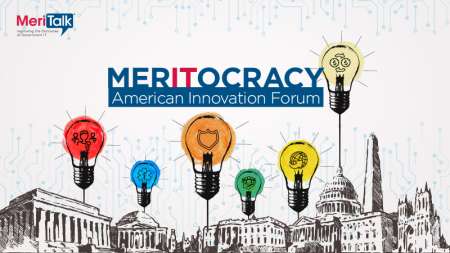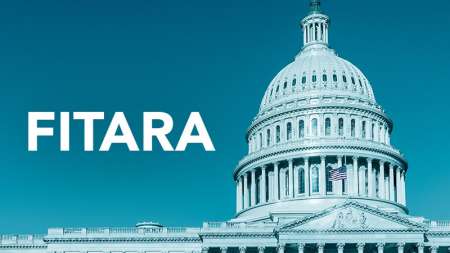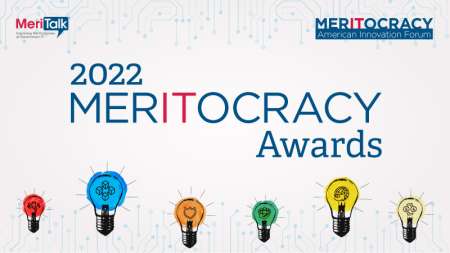The Department of Homeland Security’s U.S. Customs and Border Protection (CBP) component has awarded an 11-year, $119 million task order to AT&T to help the agency modernize its networks and ensure reliable, high-speed wireline and wireless connectivity. […]
The Fifth Annual Service to the Citizen Awards program honored five Federal government and private sector leaders on Sept. 16 at the Mayflower Hotel in Washington, D.C., for driving positive change in the delivery of government services to benefit all citizens. […]
What makes for a worthy party to celebrate a great company and community? Take a couple hundred of your best friends from government and private sector IT leadership, add in beautiful weather and refreshments, stir in a great fundraising cause, and top with players of all ages battling it out in a 500-year old game that only somewhat resembles baseball. […]
MeriTalk’s inaugural MerITocracy American Innovation Forum in July brought together congressional, administration, and business leaders to address crucial issues about technological advancements, public policy, and democracy. […]
The Indian Health Service (IHS) has awarded an $89 million contract to General Dynamics Information Technology (GDIT) for software engineering support services. […]
One of the biggest challenges facing Federal government agencies is recruiting and retaining
skilled IT workers. Providing employees with the right kind of technical training can help solve both
problems.
[…]
Automating and digitizing how government does business has become the unstoppable force for improving service to citizens, and DocuSign is lining up some of the most creative IT leaders in the Federal arena to help explain the next chapter in tech-driven gains on September 13 in Washington, D.C. […]
The Biden administration is ending its free at-home COVID-19 test program this week due to a lack of congressional funding, according to an announcement on the COVID.gov website. […]
Government organizations worldwide are making a strong push toward adopting zero trust security architectures, and at a rate exceeding that of business organizations at last check, according to a new report from IT service management provider Okta. […]
The ability of Federal agencies to improve their cybersecurity – if at all – took center stage in the 14th edition of the FITARA Scorecard issued by the House Oversight and Reform Committee on July 28. The House Government Operations Subcommittee, on the same day, explored reasons behind the apparent void of agency performance data in a sometimes-contentious hearing. […]
MeriTalk spoke with Frank Dimina, senior vice president of Americas and public sector at Splunk, about the value of log data and how agencies can facilitate collection and analysis. […]
The Army National Guard has awarded a $267 million contract to General Dynamics Information Technology (GDIT) to support the guard’s cybersecurity and IT infrastructure, GDIT announced on August 4. […]
Through the President’s Management Agenda Vision, the administration has put a spotlight on customer service in Federal government agencies. Fortunately, as agencies modernize their information technology (IT), they can employ technological solutions such as artificial intelligence (AI) and automation to transform the customer experience. […]
In a recent MeriTV “IT In Depth” episode, Robert Costello, Chief Information Officer at the Cybersecurity and Infrastructure Security Agency (CISA), and Bill Wright, Splunk’s Director of Public Sector Affairs, said new event logging requirements pose a series of complicated tests for Federal IT managers. The mandates stem from the August 2021 Office of Management and Budget (OMB) memo M-21-31, which outlines a four-tier system for logging events and describes logs on Federal information systems as “invaluable” in fighting cyber threats. […]
John Roese describes himself as a “technology optimist.” The Dell Technologies Global Chief Technology Officer illustrated that spirit at the MerITocracy American Innovation Forum on July 21, displaying enthusiasm about a U.S. wireless industry that he acknowledged has fallen far behind foreign rivals. […]
General Dynamics Information Technology (GDIT) has appointed former Army Major Gen. Garrett Yee vice president and general manager of the company’s Army sector. […]
As brutal heat waves wash over both the United States and Europe, the Biden administration has launched the Heat.gov website to help Americans and government officials understand the impact and health risks of extreme heat. […]
Barton Phillips, vice president for Public Sector at DocuSign, detailed the Federal government’s relatively slow progress to date in digitizing citizen services – and what agencies need to do to operate seamlessly in the digital landscape – during an address at the MerITocracy American Innovation Forum on July 21. […]
Implementing diversity, equity, and inclusion practices has been an important task for the Office of Personnel Management (OPM) and using technology to create a lasting outcome has been key to its Office of Diversity, Equity, Inclusion, and Accessibility (DEIA) that is in charge of implementing DEIA policy that sit at the very top of the Biden administration’s priorities. […]
Federal agencies and their Federal Systems Integrator (FSI) partners are considering how to tap into artificial intelligence (AI) to advance their missions. The National Security Commission on Artificial Intelligence is calling on Federal leaders to double research and development spending on AI, to $32 billion by Fiscal Year 2026. As with any new technology, there is uncertainty on the best way to move from pilot projects in the lab to fully implemented production solutions. […]
The Federal government – galvanized by the Biden Administration’s Cybersecurity Executive Order – has spent a lot of time and money on cybersecurity solutions, but as the digital landscape continues to evolve so does the risk. […]
What are the essential elements of innovation partnerships between government and the private sector to harness the technology that can tackle the toughest problems facing America? On July 21 – we’re going to find out. The countdown to MerITocracy 2022: American Innovation Forum is on. […]
Today, the government and private sector face similar problems with the daunting amount of cyber data, according to materials presented at GTC Spring 2022. “The volume and velocity of cyber data is extreme,” Rachel Allen, an NVIDIA senior data scientist, said at a GTC session, Transform Cybersecurity with Accelerated Data Science. “It’s estimated that over 90 percent of cyber data today is left on the floor, so to speak, and is never collected or analyzed at all.” […]
General Dynamics Information Technology (GDIT) will provide IT and network support to the U.S. Air Forces (USAF) stationed in Europe under a new $908 million contract, the Defense Department (DoD) announced. […]
Bipartisan members of the House Judiciary Committee and hearing witnesses today agreed that Congress must take action to prevent law enforcement and intelligence agencies from purchasing Americans’ personal data. […]
In today’s edition of Countdown to MerITocracy, Amazon Web Services (AWS) explains the driving forces behind the company’s innovative programs to bring more U.S. military veterans into cybersecurity and IT careers – and swell the ranks of the tech-ready as the Federal government competes for their talents. […]
Eleven of the leading voices in Congress on technology issues have won the inaugural MerITocracy Awards that recognize their meaningful contributions to the cause of innovation in technology and policy. […]
Advances in security technology have forced cyber attackers to turn to the weakest link in the security chain – the human element. With 88 percent of security breaches caused by human error, technology teams across the Federal government are searching for ways to address the human side of cybersecurity to keep networks and systems safe […]
From the earliest days of the internet, bad actors have found ways to breach security protocols to disrupt operations, steal sensitive information, and even extort money through ransomware attacks. Cyber attackers have always looked for the path of least resistance when launching an attack. Before there were strong network protocols, they would attack the network […]
At GTC Spring 2022, Bartley Richardson, an NVIDIA senior artificial intelligence (AI) infrastructure manager, said that data is coming in so fast that most cybersecurity applications are unable to capture it all, much less analyze it to identify breaches. As a result, he said, contextualizing the streams of information “is often done by a human.” […]


























